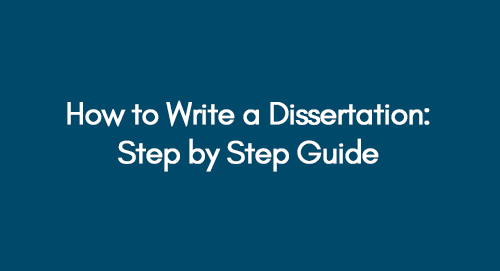
Implementation of Quality Control Measures in Construction Projects and its Impact on Project Success
July 12, 2022
How to Write a Dissertation Abstract?
July 20, 2022Can you write a flawless dissertation at the last minute?
Honestly, the answer is a resounding no.
Starting a dissertation can be challenging for some, while others may get stuck in the middle, struggling to complete it.
Explore The Importance of Dissertation in Your Academics
In school, a dissertation is super important. It shows how smart you are, how well you can research, and how you can teach your teacher new stuff. It can make a big difference in how well you do in school and later in your job. We know it can be tough, but we're here to make it easier. Our blog will help you learn how to write a dissertation step by step, so you can do a great job and get good grades.
What is a Dissertation?
A dissertation, like other academic writing, presents a scholarly argument based on research and data from a scholar's studies. It typically marks the final year project for UK and global students.
Topics are assigned by the university or proposed by students to their dissertation supervisors. Dissertations, ranging from 10,000 to 20,000 words, encompass diverse subjects, often structured with numbered headings, subheadings, and chapters.
Learn More About What is More Important in Dissertation Here
Despite findings' significance, a dissertation's 'process' matters more. You can still excel even without usable data by showcasing understanding of the research process, analyzing it, and explaining why you couldn't answer the question effectively.
How is It Different from a Thesis?
Figure out the difference between Thesis and dissertation here.
Dissertations vs. Theses
- Completion Date: Master's theses typically conclude with a thesis, while doctoral dissertations end with a dissertation.
- Purpose Difference: Theses demonstrate your knowledge, while dissertations contribute new concepts to your field.
Master's Theses
- Similar to Undergraduate Research Papers.
- Involves researching a topic, analyzing gathered information, and discussing its relevance critically.
- Opportunity to explore a subject relevant to your professional focus.
- Uses external research for guidance.
Doctoral Dissertations
- Focused on developing and defending a new concept in your field.
- Owes the majority of information to your research and contributions.
Explaining the Structure of Dissertation in Detail
Develop academic skills and prioritize planning and structuring your dissertation for success, regardless of your degree program.
Step 1: Identifying the Research Topic
Precise, well-formulated questions are fundamental in research. Effective research topics require specific search queries. Crafting a successful research topic can be as straightforward as identifying a few questions, but it's not always that simple.
Discover the Qualities that Make a Good Dissertation or Thesis Topic
The essential characteristics of a solid research topic include its uniqueness, precision, and the impact or the contribution it will have to the academic literature.
Step 2: Creating a Dissertation Proposal
For developing a successful dissertation proposal, you should select a good research topic. This paper is submitted to your supervisor in order to convince him or her how important your research proposal is.
Find out Student Submitted Dissertation Proposal Example Here
Your research should tackle intricate questions, showing its substantial contribution to academic communities. While a dissertation is shorter than a proposal (1,000 to 3,000 words), outlining key points is advisable, even if a proposal isn't required at your university.
Structure the Dissertation Proposal
It is not expected that you have thoroughly reviewed the existing literature at the proposal stage, but you must demonstrate that you have identified a clear research gap. The same goes for your research methodology, but make sure you know if you will be conducting qualitative or quantitative analysis, and how you will collect the required data.
Check Analysis of Qualitative Data Set Here
This is how the structure for your proposal should be:
Dissertation Title
The length of a title should not exceed 12 words, ideally. Your research title should clearly identify the topic.
Explore More about Dissertation Topic Ideas Here
A dissertation topic should be specific, research-worthy, and relevant to your field of study, addressing a significant research question or problem.
Aim of the Research
Give an overview of the study's overall objectives. Describe your research objectives as a researcher, emphasizing what you hope to accomplish.
Objectives of the Research
Your project should address the key research questions. Set fewer than four research objectives for your research. A study's objective or hypothesis should be connected to your research objectives.
Literature Review
To ensure that you are utilizing specific academic sources when conducting your literature review, consult with your supervisor. The literature analysis should be facilitated by researching relevant books, theories, and publications.
Step 3: Starting the Data Collection Process
In the dissertation process, this step is critical: avoid outdated or irrelevant academic sources to safeguard your work. Begin by crafting a methodology chapter to outline your research strategy, which is more straightforward than it sounds—it simply explains how you conducted your research.
To collect data, create your research design, which can involve interviews or online surveys. Allocate ample time for data collection, especially for in-person interviews, as unexpected delays can occur. After data collection, prepare it before analysis begins.
Step 4: Writing the Dissertation
Set weekly targets to boost motivation and productivity. Consider using supervisor meetings as deadlines.
Learn More about Dissertation Samples Here
While writing, deepen your understanding of the topic. Review each section for completeness and ensure clear connections with other content. Maintain a comprehensive source list, take research notes, and back up your work regularly.
Step 5: Proofreading and Editing
Never underestimate the power of proofreading. It's the key to correcting human errors and crafting well-structured, coherent, and polished work. Allocate sufficient time for comprehensive editing, logical revision, and meticulous referencing.
Include relevant citations in your main argument to demonstrate knowledge of influential theories and research. This concludes our guide; feel free to leave questions or comments in the section below, and we'll respond promptly.
Conclusion
Writing a dissertation requires meticulous planning, research, and organization. By choosing a compelling topic, adhering to a clear structure, and maintaining consistent progress, you can successfully navigate this challenging academic endeavor.
You may Contact Premier Dissertations to get any help regarding writing dissertation.
Get 3+ Free Dissertation Topics within 24 hours?
Get a Dissertation Proposal – Get Going!
Dissertation Proposal Lays Down the Outline of Your Final Dissertation
Get a Dissertation Proposal that matches your requirements, which includes the topic title, research aim and objective, research questions, research gap, literature review, methodology and list of reference papers.
The Dissertation Proposal will be foundation of your final dissertation. It is very important to get this done perfectly to avoid any problems!













